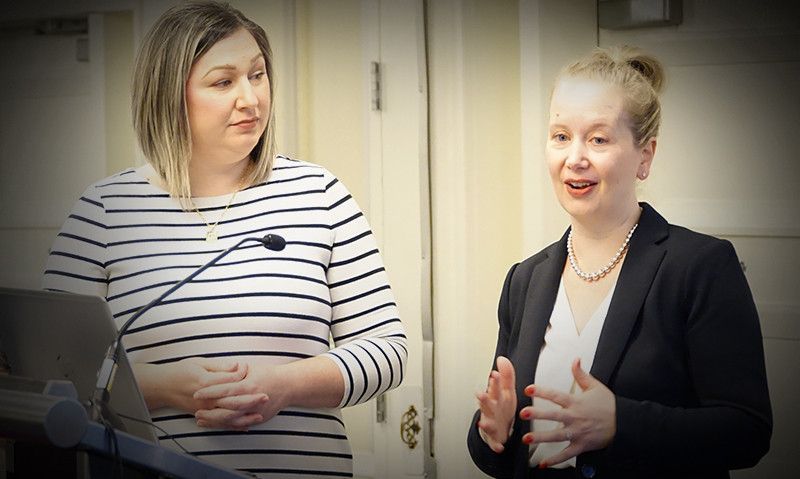
Firearms safety coalition focused on responsible gun ownership, not limiting gun rights
Donna-Marie Drucker is the wife of a combat veteran, the daughter of a gunsmith – herself a gun enthusiast – and a member of the American Legion Auxiliary. Part of her background includes hundreds of hours performing crisis intervention.
She’s also the survivor of a youth suicide attempt.
“I share that information for two reasons,” Drucker told The American Legion’s TBI/PTSD/Suicide Prevention Committee on Feb. 26 during the organization’s annual Washington Conference. “One – and I think this is really important for all of us to think about – is that I’ve never had a second attempt. I’ve never even considered ending my life again since that day. And I’m not like a unicorn here. Most people that experience thoughts of suicide or have a suicide attempt never go on to have another one. Almost 70 percent that survive their first attempt never have a second attempt. So getting help and support works.
“However, when firearms are involved, you don’t always get that second attempt. The reason I share my story is because if I’d found my father’s handguns the night that I was struggling … I would have died. It would have been quick. It would have been effective. And to think that I wouldn’t have met my husband, that I wouldn’t have had my children … it’s heavy. I don’t want that for people. That second chance matters.”
Drucker is co-founder and executive director of the Oregon Firearm Safety Coalition (OFSC), which is a collaboration of Oregon gun clubs and associations, the state and federal veterans agencies, and other organizations in an attempt to “prevent firearm suicides in Oregon through voluntary community-led strategies.” It’s a non-partisan effort that Drucker stressed does not seek to mandate behaviors or restrict the Second Amendment rights.
Drucker said she grew up in a rural part of the United Kingdom, where guns were “just a normal part of my life. I’m a gun owner. I enjoy my rights to bear arms. I feel very passionate about my gun ownership in a very responsible way. None of this is about taking away guns.
“There are facts we need to deal with, and the facts are people that own guns do not have more thoughts of suicide than people that do not own guns. People that own guns do not have more suicide attempts than people that do not own guns. People that own guns died at a considerably higher rate of suicide than people who do not own guns because they have access to a very deadly means. This is just a fact, and as gun owners, we can lead the way in changing this.”
Drucker said OFSC’s mission includes evidence-based strategies “but also knowing sometimes the evidence doesn’t exist yet. So we’re willing to try new things. We’re looking at community-based strategies … and learn from firearm owners. Having people that don’t own guns trying to explain to gun owners what they should be doing, there might be something in there we can take with us, but there’s also probably a lot of stuff that won’t work. So we need to listen to our (gun-owner) community.
“The golden rule of gun safety … is the gun is always loaded. We need an additional golden rule: time and distance between a person at risk for suicide and a firearm saves lives. So, we want this to become practice-based strategies. We want this to be passed along from gun owner to gun owner, from father to child, mother to daughter. I didn’t take a class that told me my gun was always loaded. My dad told me my gun was always loaded. So, we need to take all these strategies and put them together.”
Drucker pointed out that since 2001, the number of military/veteran suicides is more than four times higher than combat-related deaths. “The idea that our veterans are in so much pain that they’re choosing to end their own life is unacceptable,” she said. “And we need to change that.”
Ashley Taylor, the chief grants officer and veteran advocacy lead for Operation Fire Wings Foundation, works with Drucker through OFSC. A Legionnaire and U.S. Army veteran with deployments to Iraq in 2004 and 2008, she’s also a suicide-attempt survivor.
She updated the committee on how OFSC is working to advocate for veterans through “focused projects on preventing veteran suicide. We collaborate with community organizations. We also are very thankful to work with the Oregon Health Authority. This is a big part of the advocacy work we do in partnership with our state agencies. Thankfully they’re very supportive. We also like to be a hub for providing information and support to organizations that want to collaborate with us. And we listen to the communities that we serve.”
Taylor briefed the committee on the efforts of Together With Veterans (TWV), a community-based suicide prevention program for rural veterans that is funded by the Veterans Administration Office of Rural Health and urged Legionnaires to get involved in their communities with the project, noting grant money is available.
“There are different chapters of this Together With Veterans project all over the country,” Taylor said. “That Together With Veterans does is we have six evidence-based strategies that we focus on. All you have to do is implement the evidence-based strategies.”
Taylor said that in the first year of her TWV chapter’s existence, it was able to conduct a community focus group; host a dinner and information panel, during which more than 80 gun safes were distributed to veterans and their families; and facilitated peer-support training for 60 veterans.
“There’s a shortage of peers,” Taylor said. “We wanted to expand our peer-support base, and we did that. We’re really excited about that.”
